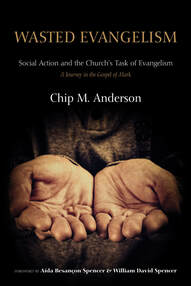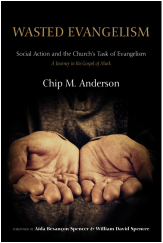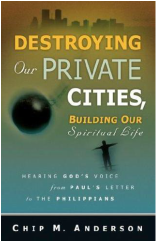Wasted Evangelism
2020 "In His Midst" COVID-19 Grab'n Go Park BBQ
2019 "In His Midst" Park BBQ
Come Visit Us: What CPC in The Hill Means to Me (#1)2018 Hill Christmas Store2018 "In His Midst" Park BBQ Line Selfies
2017 CPC in The Hill Ministry ReviewOur Call into The Hill Ministry |
Wasted Quotes“Jesus challenged the powers that ruled the world by deeds of justice and mercy. These were not marginal but central to his ministry. Therefore, since the church’s mission is in Christ’s way, ‘it is clear that action for justice and peace in the world is not something which is secondary, marginal to the central task of evangelism. It belongs to the heart of the matter” (Michael W. Goheen, The Church and Its Vocation: Lesslie Newbigin’s Missionary Ecclesiology) “It is a disastrous misunderstanding to think that we can enjoy salvation through Jesus Christ and at the same time regard action for justice in the world as a sort of optional extra—or even an inferior substitute for the work of passing on the good news of salvation. Action for social justice is salvation in action” (Lesslie Newbigin, Good Shepherd). “What the poor need is not charity but capital, not caseworkers but coworkers. And what the rich need is a wise, honorable and just way of divesting themselves of their overabundance” (Clarance Jordon). “When the Church tries to embody the rule of God in the forms of earthly power it may achieve that power, but it is no longer a sign of the kingdom” (Lesslie Newbigin in The Gospel in a Pluralist Society). “In my work as a church planter, if I had been simply focused on church sustainability and mega-growth, I would’ve missed what signs and wonders could look like in our context. But when one is measuring success at the breakdowns, the idea is not just creating permanent structures but locating the fruit that will last in people. In 2 Corinthians 3:2 Paul reminds us that the greatest testimonies are not made of brick and mortar but peoples lives for the world to see” (José Humphreys, Seeing Jesus in East Harlem: What Happens When Churches Show Up and Stay Put). “Indeed, reconciliation across racial and ethnic lines is not something Christians must achieve but a reality we must receive” (Jemar Tisby, The Color of Compromise). “It is in the church that the powers of the coming age are present as a sign, foretaste, and deposit of the kingdom [of God]” (Michael W. Goheen, The Church and Its Vocation: Lesslie Newbigin’s Missionary Ecclesiology). “Situations occur where people's needs are not met because followers of Christ have not been obedient in applying the principles that God has outlined in His Word” (G. A Getz, A Biblical Theology of Material Possessions). “If you are in a city or a community that is broken, where people are burned out or spiritually lost, where there is violence - stay there as long as you can” (Tim Keller). “Jesus challenged the powers that ruled the world by deeds of justice and mercy. These were not marginal but central to his ministry” (Michael W. Goheen, The Church and Its Vocation). “Live in the kingdom of God in such a way that it provokes questions for which the gospel is the answer” (Lesslie Newbigin). “G.K. Chesterton said, ‘It isn’t that they can’t see the solution. It is that they can’t see the problem’ . . . The problem is that there is a gapping hole in our gospel. We have preached a gospel that leaves us believing that we can be reconciled to God but not reconciled to our Christian brothers and sisters who don’t look like us—brothers and sisters with whom we are, in fact, one blood” (John M. Perkins, One Blood: Parting Words to the Church on Race and Love).
“The beatitudes are not a platform for your fame or celebrity or power . . .” (CMA). “Grace is a social revolution. Grace clears the table so hospitality can flow” (Richard Beck, Stranger God). “But the heartbeat of the kingdom of God is the local church. A specific address where a collection of disciples--sinners and misfits all--are trying to live into the ways of Jesus” (Richard Beck). “. . . Christian mission is nothing more or less than our participation in the hospitality of God” (Amos Yong). “Jesus conquers principalities and powers with contagious grace” “CNN will not be showing up at a church that is simply trusting God to do extraordinary things through his ordinary means of grace delivered by ordinary servants. But God will. Week after week. These means of grace and the ordinary fellowship of the saints that nurtures and guides us throughout our life may seem frail, but they are jars that carry a rich treasure: Christ with all of his saving benefits” (Michael S. Horton, Ordinary: Sustainable Faith in a Radical, Restless World). “. . . hospitality is not simply the practice of a virtue but is fundamental to Christianity’s understanding of God, self, and the world” (Arthur Sutherland, I Was a Stranger: A Christian Theology of Hospitality). “We often fall into the trap of thinking that the solution to injustice is to gain power, hoping that once the roles of power have been reversed, the coercion will stop. But every bloody revolution in the history of the world shows that this does not work. David inevitably becomes Goliath. The oppressed persons who seize control simply become the oppressors” (Craig Greenfield in Subversive Jesus; see my Wasted Review). “It’s easy to confuse what is with what ought to be, especially when what is has always worked in your favor” (Tyrion Lannister, Game of Thrones) “Frankly, I have yet to engage in a direct action campaign that was ‘well timed’ in the view of those who have not suffered unduly from the disease of segregation. For years now I have heard the word ‘Wait!’ It rings in the ear of every Negro with piercing familiarity. This ‘Wait’ has almost always meant ‘Never.’ We must come to see, with one of our distinguished jurists, that ‘justice too long delayed is justice denied’” (MLK, Jr., Letter from Birmingham Jail). "You say you care about the poor? Then tell me, what are their names?" (Gustavo Gutierrez) “The greatest proof of Christianity for others is not how far a man can logically analyze his reasons for believing, but how far in practice he will stake his life on his belief” (T. S. Eliot). “It is delicate work, I have found, establishing authentic parity between people of unequal power” (Robert D. Lupton, Toxic Charity) “From the very beginning Christianity was not primarily a ‘doctrine,’ but exactly a ‘community’” (Georges Florovsky). “Mainstream Christians at the center of the dominant culture, where social homogeneity reigns, need to unlearn and undo their social isolation from suffering and excluded communities through rereading at the margins. Only by repositioning their geographic horizons will churches begin to genuinely move toward a sense of belonging that does not dismiss or exclude racial others because of moral or legal qualifiers that only hold sway ‘from a worldly point of view’” (2 Cor 5:16) (David P. Leong, Race & Place: How Urban Geography Shapes the Journey to Reconciliation) “Jesus transformed meals into enacted parables to illustrate graphically that God's offer of forgiveness is extended to everyone. Like a loving Father, God invites all prodigals to recline at his table and dine” (R. Alan Streett, Subversive Meals). “. . . hospitality is at the very center of what it means to be Christian and to think theologically” (Arthur Sutherland, I Was a Stranger: A Christian Theology of Hospitality). Curious, Jesus placed His design for changing the world and for undoing the grotesque sins of humanity in our gathering together as church (CMA). "Our Father . . . calls us not to seek empowerment, but to live out our lives in the moral and spiritual equivalent of martyrdom" (Russ Dudrey). "Proximate living was the most powerful way for me to learn to practice valuing people. Living life together reveals one another's truths" (Michelle Ferrigno Warren, The Power of Proximity). The form of life Jesus offers his followers is not one of social integration but a scandal to the priestly and political establishment. It is a question of being homeless, propertyless, peripatetic, celibate, socially marginal, disdainful of kinsfolk, averse to material possessions, a friend of outcasts and pariahs, a thorn in the side of the Establishment and scourge of the rich and powerful” (Terry Eagleton, Culture and the Death of God). “Because righteousness [in the Sermon on the Mount and in throughout Matthew] is a whole-person virtuous living, for a religious community the most serious potential opposite to this is not blatant immorality but a skin-deep righteousness rather than true wholeness” (Jonathan T. Pennington in his The Sermon on the Mount and Human Flourishing, p. 92). “The gifts of presence are not always found in the comforts of getting along with each other, but rather in sitting with messiness and complexity” (Kristin Lin). “You can't serve people out of poverty, but you can neighbor people out of poverty” (Bob Lupton). “Success is not final. Failure is not fatal. It is the courage to continue that counts” (Winston Churchill). “People without imagination really have no right to write about ultimate things” (Reinhold Niebuhr). “There is an assumption that we should spend all our time, efforts, and money going after the “power brokers” or “change agents" in the city. But with the paradoxical nature of the Gospel and how God has worked throughout history, we may need to rethink that one. If not, we run the risk of doing what James wrote in his epistle, showing partiality” (Sean Benesh, Urban Hinterlands: Planting the Gospel in Uncool Places). “It is not fulfillment of self but the glory of God and the welfare of the neighbor that ought to determine ‘vocational’ choices, insofar as there is room for choice. In and through one’s vocation one picks up one’s cross, follows Christ, and participates in his self-sacrificial sufferings. Christians should not aim at self-fulfillment” (Douglas J. Schuurman, Vocation: Discerning Our Calling in Life). “The Lord’s Supper [was supposed to] reconfigure the way we experience otherness” (Richard Beck in Unclean: Meditations on Purity, Hospitality, and Mortality; brackets added by me). “If Christians live ‘in a strange land as though in [their] home country,’ they build ‘extraveagent mansions,’ and indulge in ‘countless other luxuries,’ wasting their substance on ‘inanities’ [a nonsensical action, silliness]. Because, when forced to leave the land of their sojourn they will be unable to take their possessions and buildings with them, Christians should instead use their wealth to benefit those in need” (Christine Pohl, Making Room). “Cowardice, on the other hand, wants only to concern itself with the really important, big things, not in order to carry something out whole-heartedly but to be flattered by doing something that is noble and great. Yet hiding behind the exalted is nothing but an excuse for not conquering all the little things one has omitted, simply because they were little” (Søren Kierkegaard, “Dare to Decide”). “To thirst for righteousness is to long for God’s saving intervention in history, and to be satisfied is to enjoy the land of milk and honey” (Tim Chester, Good News to the Poor). "The contemporary church is a weak, ineffectual voice with an uncertain sound. So often it is an archdefender of the status quo. Far from being disturbed by the presence of the church, the power structure of the average community is consoled by the church’s silent and often even vocal sanction of things as they are" (Martin Luther King, Jr, “Letter from Birmingham Jail,” April 16, 1963). “If you are so afraid of the social implications of the gospel, you will be inadequate at discipling others to be the life of Jesus on earth” (Anonymous). |
Wasted Evangelism,
|
Wasted
|
Lay Commentary on PhilippiansA readable expositional lay commentary on Paul's Letter to the Philippians, without the content being dumbed-down.
|
Pages |
More Pages |
|



